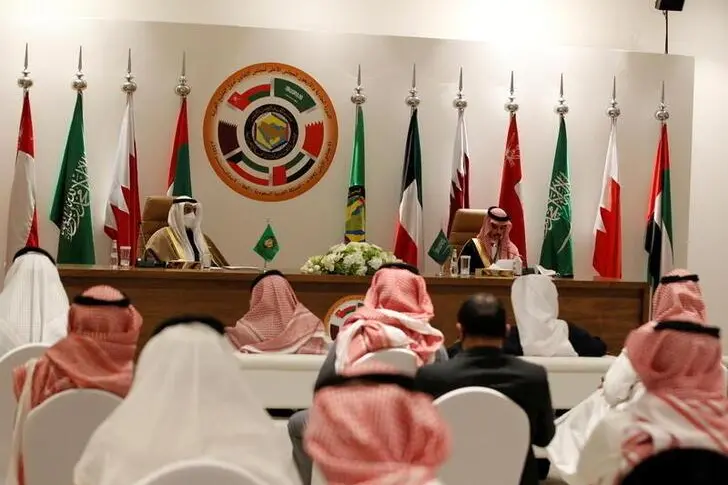PHOTO
The Gulf Cooperation Council summit that concluded on Tuesday night came at a critical time for regional security, the urgent push toward economic diversification and coordinated action on climate change. The Vienna talks are in deadlock, especially after the new Tehran administration’s backsliding on its previous commitments. The US withdrawal from Afghanistan and drawdown or repurposing of its forces in Iraq cast a shadow, although they are not directly related to Gulf security.
On the positive side, GCC economies are looking up with the improvement in oil prices and the maturity of some economic reforms. For example, this week Saudi Arabia announced that it expects its 2022 budget to register a surplus of $24 billion after several years of significant deficits. Also positive is the new strong commitment to tackling climate change, which in the GCC context includes reforestation drives and fighting desertification.
The summit was preceded by Saudi Arabia’s Crown Prince Mohammed bin Salman’s visits to the five other GCC countries, a move that contributed to the success of the summit. The tour lasted for more than a week and addressed the most important issues facing the region, as shown in the joint statements issued after each visit. The tour was no protocol exercise but unprecedented in its scope, duration and the significance of the issues under discussion, in addition to its critical timing.
Greater economic integration between GCC countries was one of the goals of those visits and it is a perennial issue in every GCC heads of state gathering since its founding in 1981. This process has gained more urgency as doubts gather about how long the easy days of high oil revenues will continue. All GCC countries have embarked on ambitious diversification plans to prepare for the future. In the GCC context, diversification means several things, all of which are important for the post-oil future — diversification of gross national product, the industrial base, sources of government revenue, exports and energy.
Regional security is the main issues every GCC summit addresses and this one is no exception. The sense of urgency is heightened by Iran’s escalation as evidenced by the fervid activities of some of its proxies. The Houthis resumed attempts to attack the Saudi capital Riyadh with ballistic missiles and intensified their attacks against Yemeni government forces. In Iraq, Iran’s aligned militias have challenged the results of the Oct. 10 elections and tried to assassinate Prime Minister Mustafa Al-Kadhimi. In Lebanon, Hezbollah, Iran’s key operational arm, has frustrated the country’s efforts to climb out of the economic abyss and political gridlock in which it has languished for some time.
The GCC is now the principal group challenging Iran’s attempts to impose its regional hegemony and export its extremist revolution by force. The GCC is stepping up its defenses while also extending an olive branch to Iran. Last month, the new headquarters of the GCC Unified Military Command was inaugurated, two years after the appointment of its commander, Gen. Eid Al-Shalawi, a former commander of Saudi Arabia’s land forces. The new structure coordinates the work of different branches of GCC forces, including air, naval and land forces. The GCC joint communique issued at the end of the gathering stressed the principles of collective defense and joint military responsibility, enshrined in the GCC Mutual Defense Treaty.
While the GCC states are constantly modernizing their militaries and upgrading their defenses to deal with old and emerging threats, such as cyberattacks, they expressed in their joint statement their readiness to engage with Iran according to the same terms communicated to the previous Iranian administration of Hassan Rouhani. A number of GCC countries have recently engaged Iran in direct discussions in the hope of finding a path toward de-escalation.
If the talks in Vienna fail and Iran continues its current policies, the region could face disastrous results, including nuclear proliferation and a nuclear arms race, robbing its citizens of funds that would be diverted to guns instead of butter.
One of the most important documents issued at the Riyadh summit on Tuesday evening was the Riyadh Declaration, a forward-looking set of agreed principles to guide GCC progress in the coming years in security, foreign policy, development and the environment.
On the environment, the Riyadh Declaration endorsed Saudi Arabia’s recent green initiatives as a basis for joint GCC work on climate change and renewable energies. The document urged a greater role for women in development and joint GCC action as well as for young people, SMEs and the private sector in general to play greater roles in digital transformation and economic diversification efforts.
Learning from recent experience with combating COVID-19, the GCC summit called for greater preparedness for future pandemics, learning from best practices in fighting the current one and coping with its economic and social repercussions.
Connectivity was among the areas with renewed emphasis at this summit, which endorsed the establishment of a GCC railway agency and called for greater integration of transport and communications networks. A number of GCC countries, such as the UAE and Saudi Arabia, have built up their rail and metro systems, and the Riyadh Declaration called for GCC-wide infrastructure connectivity. These mammoth projects will help integrate the six countries and create the kind of ancillary industries that would help diversify their economies and create jobs.
- Dr. Abdel Aziz Aluwaisheg is the GCC Assistant Secretary-General for Political Affairs & Negotiation, and a columnist for Arab News. The views expressed in this piece are personal and do not necessarily represent GCC views. Twitter: @abuhamad1
Copyright: Arab News © 2021 All rights reserved. Provided by SyndiGate Media Inc. (Syndigate.info).





















